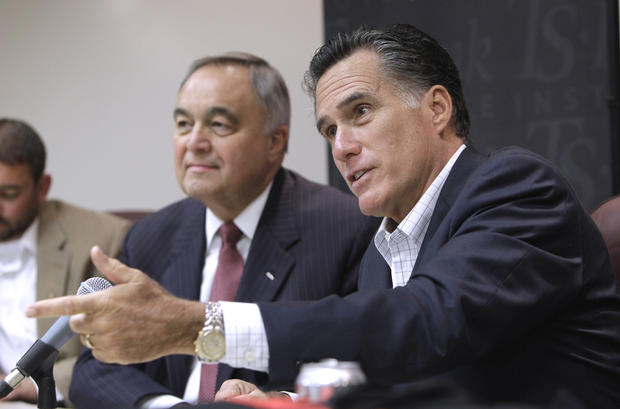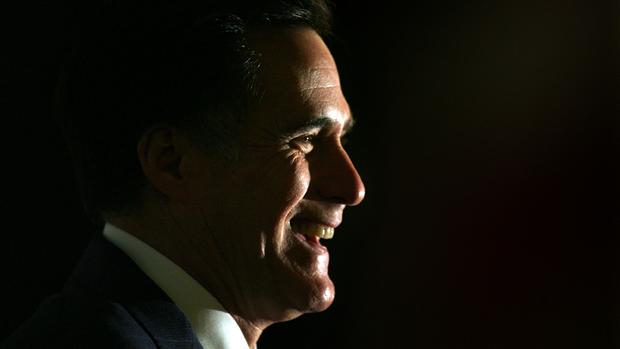Can Romney win Iowa?
This post originally appeared on Slate.
SIOUX CITY, Iowa -- Iowa is a dusty place this time of year. Billows rise up from the combines in the field as the corn is harvested. Your eyes get scratchy. But no dust sticks to Mitt Romney. He is the stainless-steel candidate: precise, technically flawless, and lacking warmth. "I love this country," he said at the end of his town hall at Morningside College Thursday morning. "I hope I made that clear. I didn't say that as directly as I'd like to: I love America." Yes, he was sincere, and yes, the delivery was synthetic.
This was Romney's first visit to the state since the Ames straw poll in August, so he had some explaining to do. "I'll be back again and again," he said. "I'd like to win Iowa." Throughout the day he told Iowans how important they were to the electoral process.
The Romney campaign has been coy about how hard it's going to campaign in Iowa in an attempt to lower the stakes so that if Romney doesn't do well, no one will draw larger conclusions about the weakness of his candidacy. But it is becoming increasingly clear among Iowa's political class that Romney can win Iowa. And if he were to win the caucuses here, his strength in New Hampshire would make him almost impossible to beat for the nomination.
Romney has a chance to do well in Iowa because he starts with a solid base of available voters. He won 26 percent of the vote in 2008. If you add the percentages other moderate candidates such as Rudy Giuliani, Fred Thompson and John McCain received, that's another 27 percent of the electorate that may be inclined to consider him. And there are signs that social conservatives are willing to give him a fresh look, too. In 2008 James Lewis of Sioux City voted for Mike Huckabee. But Lewis is going with Romney this year. Why? "I went with Huckabee because I liked his values stance," Lewis says. "Today the values are important but cutting spending and getting the economy back rather than bailing out the banks is more important."
Romney has one of the best organizations in Iowa, but it's hidden. The theory is that if it stays active but under the radar, it can make a smash-and-grab at the last minute if the environment is right. "They have kept Mitt Romney's name in front of my face every week," says Steve Armstrong, chairman of the Linn County Republican Party. "He may be out of view in Iowa, but he's not out of view on e-mail, Facebook, and Twitter." The question is whether the vestigial support Romney worked so hard to earn in 2008 is like a car battery that has sat dormant all winter. Can it be turned on easily, or will it require more of the retail politicking Iowans pride themselves on demanding?
The non-Romney vote is so split and the issues of this election are so favorable, Romney may not have to work that hard to do well in Iowa. On the other hand, if someone like Rick Perry were to take off, Iowa would become a geographic symbol of the fact that he hasn't been able to gain more than a quarter of the electorate's support in the polls despite all the time Romney has spent campaigning, his natural fit for the economic moment, and Republican voters' desire for someone who can beat President Obama.
As he toured the Western part of the state, Romney was all business all day. Even in rural areas, he campaigned in his natural habitat, sitting in the ersatz leather swivel chair the end of a conference table of business leaders at a local bank in Treynor, speaking at the Council Bluffs Chamber of Commerce.
He stressed his 25 years in business about as often as the rest of us inhale and exhale. "I love you. I love business," Romney said in Council Bluffs. He talks about himself as "a business guy," in the detached third person way Bob Dole used to talk about "Bob Dole." To the extent that Romney ever struts, it's when talking about his inner CEO. "I am a capable enough business guy to know when people are blowing smoke and when they're not," he said when explaining how he would determine what federal programs should stay and which ones should go. The questioner had asked about farm supports, which Romney said he may or may not continue to support. "I'm not running for office based on making promises about handing out money--more money for schools, more money for farmers."
Romney said Obama didn't know how to lead. That's not a new critique, but Romney's emphasis was on how Obama lacked the leadership skills necessary to build consensus with the other party. Referring to his own time in Massachusetts with a heavily Democratic legislature, Romney argued that he knew how to compromise without compromising his principles. In 2008 Obama ran as a bipartisan consensus builder based on his theory of how it might be done at the executive level. Romney argues he has the practical knowledge.
For a state in which 60 percent of the caucus voters describe themselves as evangelicals, Romney stressed electability. He mentioned social issues only once--in an awkward exchange with a woman about birth control. She asked him if he knew that an abortion pledge he'd agreed to sign which stipulated that life begins at conception, prohibited the use of birth control. She cared, she said because she used birth control. He said he didn't support blocking birth control.
Romney acted like Tuesday's acrimonious debate in Las Vegas hadn't happened. He was so focused on Obama and the general election that he made only the most glancing reference to his opponents. In response to a question about immigration, he noted that one of his rivals (Perry, though he didn't name him) had supported a program to give in-state tuition rates to the children of illegal aliens. Though Romney's aides tamp down talk of inevitability--they do not mind the repeated rise of alternative candidates--their candidate sounded pretty confident that his focus on the general election was warranted. "There s a good shot I might be the president of the United States," he told the business leaders in Treynor. "If I do, I will benefit from your thoughts."
If it sometimes seems as if Herman Cain and Rick Perry are rushing around in their headspace looking for facts to string together, Romney is the opposite. He knows the details of energy expenditure and output in ethanol production. He knew the kinds of cattle raised and the graduation rates of the local school district. At the roundtable with local business leaders, he dished out his fair share of generalities. But it was clear, as he connected the dots between the comments of the feed lot operator and the ethanol producer, that he was actually listening. His only slight slip was that he was about $2 off on the price of a bushel of corn. He will never get that fact wrong again.


